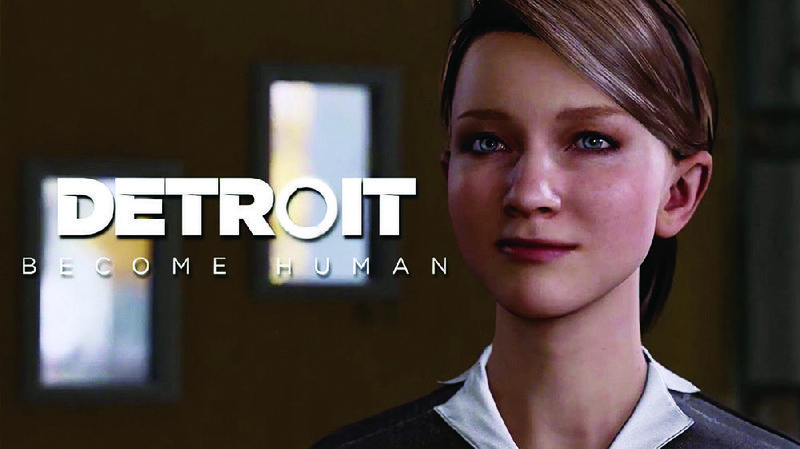Detroit: Become Human is Quantic Dream's latest work that hovers somewhere between film and video game.
The development studio's creator, David Cage, is known for pathos-inducing storylines that mirror real life. His work can be a bit heavy-handed at times, but Detroit: Become Human is undoubtedly his best offering to date in narrative-driven game play.
Title: Detroit: Become Human
Platform: PS4
Cost: $59.99
Rating: Mature, for blood, intense violence, partial nudity, sexual themes and strong language
Score: 8/10
Set primarily in a Detroit 20 years in the future, the game sees a city that's no longer making cars but one that produces androids that can fulfill virtually any role in society and have replaced a large part of the human workforce. The androids work as teachers, shop assistants, in offices, as laborers and mechanics, entertainers and as medical staff.
Despite their prominence in society, androids are not considered human and have no rights.
In public spaces, androids must wear a uniform that clearly identifies them as such, including a neon-blue armband.
The game is also set against the backdrop of a growing societal anger as more and more humans are unemployed. The sci-fi setting echoes the struggle for civil rights in America and worries over machines replacing workers. If the metaphor wasn't obvious enough, there's even a special compartment in the back of public transportation vehicles for androids to use.
The game features three playable characters. The androids Connor, Kara and Markus have different makes, backgrounds and functions in society. Connor is a police prototype model whose job is to hunt down "deviant" androids -- those that have strayed from their expected programming. Kara is a housekeeper who witnesses domestic violence, and who cares for a little girl named Alice. Markus is a caretaker for an elderly painter, and then starts painting as a form of self-expression.
In earlier Quantic Dream games, it often felt like the story itself was on rails -- that no matter what choices the player made, the end outcome was the same, and the main character couldn't die. In Detroit: Become Human it is entirely possible for the main characters to die -- part of the challenge is making them all survive to the end.
Action sequences are executed using timed button presses, swoops of the thumbstick, the controller's touchpad or even swinging the controller around in actions that mimic what the character does on screen, and in making dialogue choices that advance the narrative.
The quick-time events aren't necessarily about combat moments, as with sword swings and firing guns. They can be about the mundane, such as wiping down kitchen counters, making a bed and kneeling to speak to a child.
At the end of each chapter, you see a branching flowchart of each choice you made -- that also shows you global statistics of which choices other players around the world made. While there's an unchanging backbone to the story, because of the many choices given to the player it has more than 1,000 possible endings.
A single play-through of the game takes about 10 hours, but this is a game designed for multiple play-throughs. There are a possible 32 chapters, but you might not see them all as some depend on your decisions.
For those wanting to try every route and piece of dialogue, the game offers about 40 hours of content. The flowchart feature means you can jump back in quickly at various checkpoints to choose different decisions and explore different outcomes.
Detroit: Become Human is a single-player game only, and with no current plans for any downloadable content. There are also no microtransactions. The graphics are pretty great; there are more than 500 characters in the game portrayed by 250 motion actors.
The soundtrack really helps. Each protagonist has a unique soundtrack, each by a different composer. Connor, who is cold and mechanical, has a primarily electronic soundtrack. Kara's is emotional and moving, while Markus' music is soaring and grand, as in an epic tale. The full original soundtrack playlist surpasses four hours in length.
There are two difficulty settings for the game -- on the easy mode, the focus is on the narrative and the main characters will not die, no matter what choices are made, making it very accessible even for those who aren't traditional video-game players.
In all, I found Detroit: Become Human to be a fun game to play. Each main character had different goals, motivations and abilities, and the consequences for the decisions had real impact on what happened next in the narrative. I also really liked comparing my choices to that of the general population.
While many works have explored androids becoming more human-like, the game feels more relevant than ever as our society progresses from science fiction to reality, and the issues explored once only in theory will one day be practical considerations.
ActiveStyle on 06/11/2018
